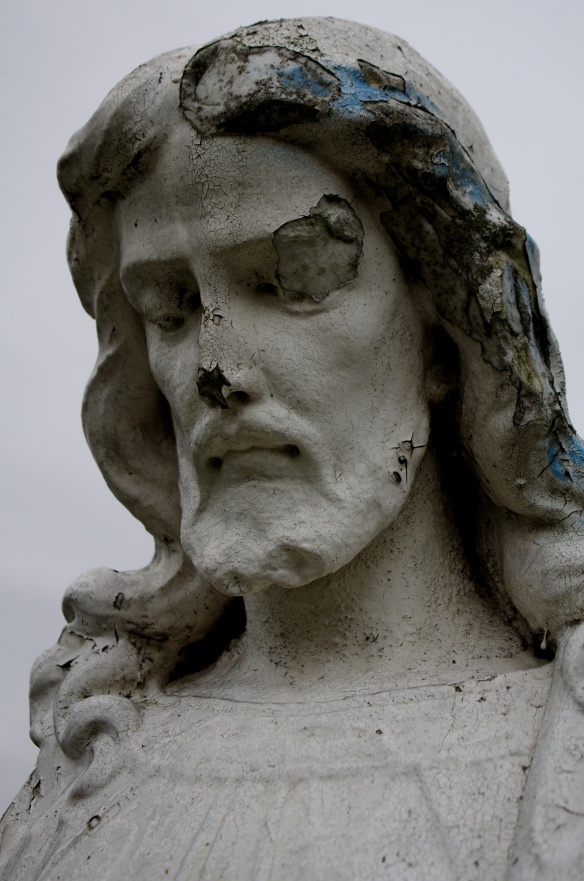
I hope you all had a lovely Easter…
For us, this Easter has been one of great contrasts. We had a trip down to Nottinghamshire to attend the wedding of my lovely niece to a young bloke that I have become increasingly fond of. It was a lovely day; the ceremony was led by another friend at the church I attended as a child.
The contrast was that while all this was going on, my wife has been trying to come to terms with the death of her father, who passed away on Wednesday.
All of this obscured the feast of Easter. As someone who continues to make my spiritual journey primarily through the words and teaching of Jesus, I wanted to take some time out to reflect again on what this season might mean, in the close presence of both joy and deep loss. My rather obvious initial thought was that Easter contains both the reality of death and the hope that love can transcend even this.
As always at Easter however, I also find myself thinking about this word ‘atonement’. Those of you who are not of a religious bent may have heard of the word, but perhaps will not know that it has long been a theological football. For much of the modern era, within protestant circles at least, a very narrow, legalistic view predominated; Jesus died on a cross in order to pay the price of our sin. God the father required a sacrifice, in the form of the punishment of his son, in order to atone for those who are prepared to believe. I have made no secret of my own frustration at the limitations of this version, known as ‘substitutionary atonement’.
Back in February, Michaela forwarded me a Richard Rohr meditation that she had signed up to receive daily. He says it a lot better than I could, so here it is.

Franciscans never believed that “blood atonement” was required for God to love us. Our teacher, John Duns Scotus (1266-1308), said Christ was Plan A from the very beginning (Colossians 1:15-20, Ephesians 1:3-14). Christ wasn’t a mere Plan B after the first humans sinned, which is the way most people seem to understand the significance of the death and resurrection of Jesus. The Great Mystery of Incarnation could not be a mere mop-up exercise, a problem solving technique, or dependent on human beings messing up.
Scotus taught that the Enfleshment of God had to proceed from God’s perfect love and God’s perfect and absolute freedom (John 1:1-18), rather than from any mistake of ours. Did God intend no meaning or purpose for creation during the first 14.8 billion years? Was it all just empty, waiting for sinful humans to set the only real drama into motion? Did the sun, moon, and galaxies have no divine significance? The fish, the birds, the animals were just waiting for humans to appear? Was there no Divine Blueprint (“Logos”) from the beginning? Surely this is the extreme hubris and anthropomorphism of the human species!
The substitutionary atonement “theory” (and that’s all it is) seems to imply that the Eternal Christ’s epiphany in Jesus is a mere afterthought when the first plan did not work out. I know there are many temple metaphors of atonement, satisfaction, ransom, “paying the price,” and “opening the gates”; but do know they are just that–metaphors of transformation and transitioning. Too many Christians understood these in a transactional way instead of a transformational way.
How and why would God need a “blood sacrifice” before God could love what God had created? Is God that needy, unfree, unloving, rule-bound, and unable to forgive? Once you say it, you see it creates a nonsensical theological notion that is very hard to defend. Many rightly or wrongly wondered, “What will God ask of me if God demands violent blood sacrifice from his only Son?” Particularly if they had a rageaholic or abusive parent, they were already programmed to believe in punishment as the shape of the universe. A violent theory of redemption legitimated punitive and violent problem solving all the way down–from papacy to parenting. There eventually emerged a disconnect between the founding story of necessary punishment and Jesus’ message. If God uses and needs violence to attain God’s purposes, maybe Jesus did not really mean what he said in the Sermon on the Mount (Matthew 5), and violent means are really good and necessary. Thus our history.
In Franciscan parlance, Jesus did not come to change the mind of God about humanity; Jesus came to change the mind of humanity about God. This grounds Christianity in pure love and perfect freedom from the very beginning. It creates a very coherent and utterly positive spirituality, which draws people toward lives of inner depth, prayer, reconciliation, healing, and even universal “at-one-ment,” instead of mere sacrificial atonement. Nothing changed on Calvary, but everything was revealed as God’s suffering love–so that we could change! (Please read that again.)
Jesus was precisely the “once and for all” (Hebrews 7:27) sacrifice given to reveal the lie and absurdity of the very notion and necessity of “sacrificial” religion itself. Heroic sacrifices to earn God’s love are over! That’s much of the point of Hebrews 10 if you are willing to read it with new eyes. But we perpetuated such regressive and sacrificial patterns by making God the Father into the Chief Sacrificer, and Jesus into the necessary victim. Is that the only reason to love Jesus?
This perspective allowed us to ignore Jesus’ lifestyle and preaching, because all we really needed Jesus for was the last three days or three hours of his life. This is no exaggeration. The irony is that Jesus undoes, undercuts, and defeats the sacrificial game. Stop counting, measuring, deserving, judging, and punishing, which many Christians are very well trained in–because they believe that was the way God operated too. This is no small thing. It makes the abundant world of grace largely inaccessible–which is, of course, the whole point.
It is and has always been about love from the very beginning.







